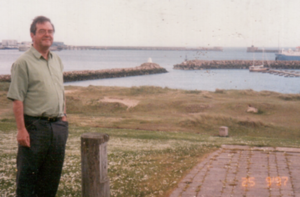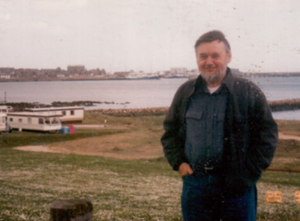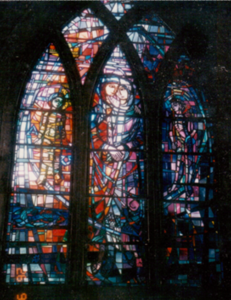Saturday, June 7,2003
Another breakfast at the hotel, then a cab to the train station at Crewe, a train to the Manchester airport, and a flight to Aberdeen. Traveling is easier alone. Although one might think that another person would help find things, and avoid mistakes, and share the load, in practice, it isn’t so. I watch myself traveling very efficiently, very smoothly, except for moments of confusion that a moment sorts out without much difficulty. I watch myself glide smoothly from the train through the maze to the right place to check in for the flight, and even my movements are smooth and sure, usually. Far more so than if I were with someone, my attention half on the companion. This of course has nothing to do with the companion and everything to do with the way I operate.
I like the British ways so much more than commercial-American. At Dulles airport, every 15 minutes came a strident warning that “for security reasons” you mustn’t leave your baggage unattended; unattended baggage would be seized for inspection and might be damaged or destroyed. Here in Manchester, a pleasant voice merely asked passengers “to reduce the number of security alerts by keeping your luggage with you at all times.” No threats, no stridency. Same message underneath, but all the difference in the world how it was delivered.
We take off at ten till noon. I’m nearly the only person who doesn’t have a seatmate. During the flight, I review the previous day’s events. My travel plans had proved practical. Seeing Robert first on Thursday and then going to the hotel and sleeping all those hours helped me adjust nicely. And I note that when Rita and I get together, usually three evenings a week, we usually end the evening with a meditation that comes through me from the guys. The content of those meditations involves not only the river of life and health, but a reminder to envision a blue flame on the foreheads of ourselves and of others – a blue flame signifying the consciousness that observes our lives, which reminder helps me be more charitable, less judgmental of others. Rita and I have been accomplishing things without even quite noticing it.
I write, “David, I like your country right well, despite the strangeness of little things.”
“And don’t think I don’t like yours, despite the same things you would cite. America was a dream to us, you know. It wasn’t by chance that I – you – were reborn in America. It carried the sense of spaciousness, of newness, of opportunity. It would have been too tiring for an older man, and too hard, not knowing the right people, to find compatible minds. But it was in the dream, eh?”
“And besides you had other things to do. What were they? Were you really [as we had gotten some years before] an editor on the Illustrated London News?”
“London Illustrated News, yes. Sub-editor, actually. Your friend’s [Kelly’s] glimpse of me was an accurate snapshot of my life then – being the grand old man (in a minor way) to my boys. I was the one who had been there and seen things and could tell tales.”
[But – maddening inconsistencies! The right title for the paper is Illustrated London News, not London Illustrated News. If I was really talking to David, why would he mis-name the paper he worked at? Why, in fact, make a point of “correcting” into error what had been correctly expressed? No way to know. Maybe I was just making it up.]
We’re down at Aberdeen at 1 p.m. and I have scarcely retrieved my bag before I am met by a smiling Michael Ross, the first time we’ve seen each other since we met in Virginia when he did his Gateway at TMI. Michael, who has been involved with out-of-body experiences since he was a boy, had showed me and my friend Nancy Dorman a couple of energy exercises that were so powerful it was all we could do not to “click out.” (That’s a TMI term that means going out so far that you bring back no recollection of it. Subjectively, one minute you’re here, then you’re back – but from where?)

Michael Ross on his home turf
Michael offers to drive me wherever I want to go, by whatever route I want, on our way to Findhorn. So we go round by way of Peterhead, Macduff, Banff, Cullen, Elgin, and Forris, talking of course as we go. Among the things we talk about are Robert and his great wealth of knowledge about dreams. We pass through great stretches of green, interrupted by buildings or towns. There is less of man in the landscape than in America. Nice, but one wonders what the people live on. We stop for lunch at Peterhead, and I find a postcard depicting Iona from the air. Makes the days I’m going to spend there seem more real somehow.

At Peterhead
Just before we come to Forris, Michael brings us to Pluscarden Abbey, which turns out to be a moving and memorable experience. Pluscarden, like so much else of the medieval Catholic presence in Britain, was destroyed by the Protestant revolution. Now it is being restored, and there is a small community of priests and monks living there while the restoration goes on.
When we walk up to the buildings, I put my hands on the old unreconstructed stones, trying to experience it. Inside, we look at the stained glass windows high above us, and we are among the stone, and the atmosphere sinks in further. We come to a portion with pews and kneelers, and I get down onto my knees – an impulse I’d had earlier – and put my head in my hands. I fall – rise – into a state of deep reverence and surrender. It doesn’t last long (I am well aware of Protestant Michael standing next to me, though I get no sense of his judging me) but it is very deep. I think, it would be well to bring the holiness back into our lives, or rather, into life, into the life of our time and the time to come.

Pluscarden window
But the sight of some Catholic literature in a rack raises resistances in me stemming back to my teen years. I have the same feelings of deep uneasiness when a priest – I suppose he is a priest – passes. My reaction is like a Protestant’s – and yet I was fully experiencing, savoring, what we might call the stone memories. As we are walking back to Michael’s car, I say to him that the Reformation, like the French revolution, was the equivalent of a nervous breakdown in its effect on our psyches – for current Protestants are likely to have good Catholics among their soul heredity, and certainly have them in their physical heredity. Thus they are at war with themselves, internally, life against life. Our stupid age, of course, believes that what is past is past, not knowing that feelings and other lives have no time. And even Catholics today are likely to be at war with other parts of themselves that have other values, other ways of being. And this confines the argument only to the west! What of the schisms between east and west, and both and Islam? And all these and others?
We arrive at the Findhorn community too late for things, but we walk around it a bit, and then find out b&b in Findhorn itself. We have a great walk out to the water in the late daylight. (It stays light in Scotland in June about 25 hours a day, or anyway from 3:30 a.m. to past 10:30 p.m.) Michael tells me of a dream he’d had, of visiting Findhorn on a beautiful day, when gale-force winds blow up, and overturn the old caravans he likes, the ones that went back to Findhorn’s early days. I help him analyze the symbols, and it resolves quite easily: the winds of change are going to overturn everything that is not substantial. In communities like Findhorn, presumably – intentional gatherings of people who would live spiritually. I wonder what else it means, how widely applicable it is.
I go to bed much earlier than Michael. I’m still adjusting.